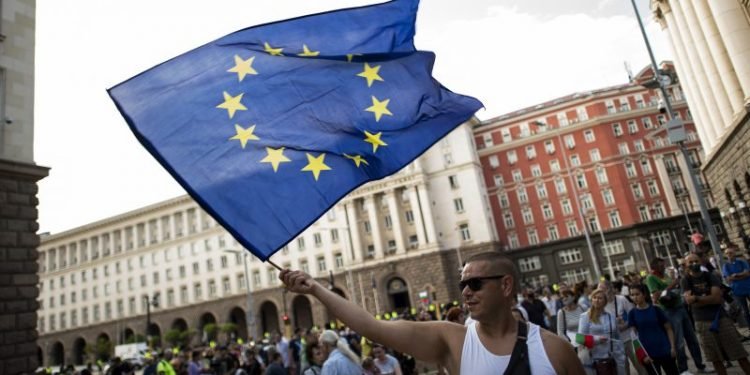Grassroots activism and European integration
The Leave campaign in the UK described Brussels as a sterilised laboratory of policies, dissociated from the needs and aspirations of people in the UK such as fishermen, farmers, pensioners, and the underprivileged. Similarly, the EU is portrayed in many post-Soviet countries as the epitome of moral decay, a place in which values are incidental to the real project of neoliberal assault on the nation-state, the nuclear family, and traditional values.
This image of the EU has always loomed. For decades, the dominant discourse about Europe was that of the perceived democratic deficit, whereby Brussels decision-making is done in secret behind closed doors. That may very well be part of the truth, whereas others seem to think that the EU policymakers were always responsive to street protests, from Athens and Madrid to Prague and Budapest, and all the way to Minsk.
Brussels Morning revisits this truism, engaging with Víctor Fernández Soriano, a Spanish specialised in transnational human rights activism. Professor Fernández Soriano studied at Université Libre de Bruxelles (ULB), Universidad Complutense (Madrid), and at the Scuola Normale Superiore (Pisa). He is of immigrant descent and truly the product of modern European culture, one in which people move in search of opportunity, education, often driven by a nothing more than a thirst for the realisation of democracy.

Brussels Morning (BM). How do you understand democratic legitimacy? Do you feel that European integration is a project of top-down political transformation, at its core democratically illegitimate?
VFS: European integration is recognised as a vector for democratisation. The European Union today plays a significant role promoting democracy and, more broadly, human rights. The EU’s external relations have historically sought to promote democracy and human rights in third countries via enlargement, neighbourhood policy, cooperation, or association agreements.
However, the challenge of democratisation within the EU has historically been framed in terms of legitimacy and it is not a top-down dynamic.
The European Union has consolidated and benefitted from grassroots activism that has reclaimed democracy from below, facing up to authoritarian rule at different stages in European history. The case of today’s Belarusian protests mirrors a long history of democratic unrest that also spurred change within the EU. There are multiple connections between grassroots movements and European integration.
BM: What is the link between EU democracy and activism in Belarus?
VFS: Back in the 1960s, protest played a key role in circumscribing the dictatorial regimes of the south to the margins of European integration.
Spain under Franco’s rule and Portugal under the Estado Novo sought institutionalised relations with the European Community. Francoist Spain formally requested an association conceived as a pre-accession regime in 1962.
A network of transnational groups of activists, composed of antifascists, European federalists, pacifists and others, opposed these demands. The European Community stood on the right side of history, limiting negotiations with these countries to trade agreements.
When Greece fell under the dictatorial yoke of the colonels’ regime in 1967, solidarity movements with the Greek people sprung up globally. This international human rights movement gathered momentum, subsequently leading to Greece’s exclusion from the Council of Europe and the freeze of the Greece’s association agreement with the European Community that had been in place since 1961. In that context, the European Community introduced the idea that there were some implicit political standards in its external relations. And the stakes were higher for the other European countries.
BM: So, protests actually make a difference? Could you say that someone in Brussels is actually listening to the protestors in Minsk or Kiev?
VFS: In the 1970s, Spain, Portugal and Greece were faced with mass rallies and demonstrations that reclaimed political change right before or after the dismantlement of their respective dictatorial regimes. The European Community linked its agenda on Southern Europe to the democratic will expressed by the demonstrators. In August 1975, referring to the case of Portugal, Christopher Soames, then Commissioner for External Relations, declared that “it is for the Portuguese people, we hope, to decide their own future and what I think we ought to do is to make it quite clear how we would react to what circumstances”.
Within these countries, accession to the European organisation was increasingly perceived as a goal linked to democratic consolidation. In this context, democratisation became an explicit condition for accession to the European Community too. The EU’s southern enlargement to a European democratic identity at a time when the European Parliament became a “more democratic” assembly, elected by direct suffrage.
BM. Yes, which brings us to the fall of the Berlin Wall.
VFS: Similar patterns emerged after 1989 when a tide of democratic change swept across Central and Eastern Europe. Mass demonstrations and calls for democratisation were a catalyst for political change. Democratisation was perceived in terms of a Western model based on human rights and the rule of law. The EU was seen as the epitome of this model. Accession to the EU, once again, an objective associated with democratic legitimacy.
However, the European Union was still a democratic model in the making, in the process of defining its own identity through new treaties (Maastricht, Amsterdam, Nice, Lisbon), policies (the 1993 Copenhagen criteria) and even its own Charter of fundamental rights (adopted in year 2000). The events in the Eastern neighbourhood had a strong impact on this process. There was some form of quid pro quo between grassroots unrest in these countries and democratic progress within the European integration process towards the countries becoming full members of the European Union. That did eventually happen in the 2000s, once the engines of human rights and democratic compliance seemed fully in motion inside the EU.
BM. So, what you are saying is that the EU is not as “top-down” a project as it is portrayed?
Grassroots activism against authoritarian rule, expressed through civil disobedience, transnational solidarity, and protest, has gone hand-in-hand with European integration. In historical terms, it not only lies at the origins of political change by prompting a revolution against authoritarian rule in a country, but it also has contributed to shaping a European model of democracy.
Such a model is identified with human rights and has its origin in the West. In the context of the Cold War, it served to gauge a European identity in the West outlined by opposition to far-right dictatorial rule in the South and communist dictatorial rule in the East. With regard to the European Union, it remains a malleable model, sensitive to democratic unrest and permeable. Sometimes entangled in the local context (such as during the protests in Ukraine in 2014), sometimes prone to endorse the opposition, the European model has constructed itself a reputation throughout time that still holds a powerful sway.




